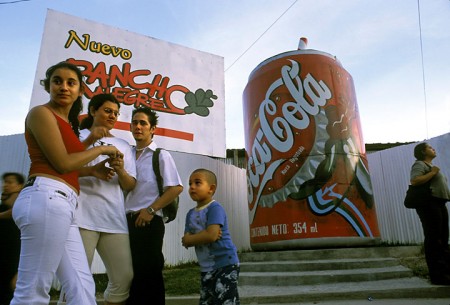The North American Free Trade Agreement (NAFTA) went into effect in 1994. NAFTA is a regional agreement between the Government of Canada, the Government of the United Mexican States and the Government of the United States of America implementing a free trade area.

These young people waiting at a bus stop were skeptical of the benefits of extending NAFTA to Central America, San Salvador, El Salvador, 2003. Copyright © Donna De Cesare.
The NAFTA Secretariat is an independent agency responsible for overseeing implementation of the agreement and impartial resolution of disputes.
Since its implementation NAFTA has become a controversial symbol in debates about globalization. Supporters of globalization include multi-national corporations, the banking industry, business leaders, and some economists. They argue that NAFTA is creating hundreds of thousands of new high-wage U.S. jobs and has raised living standards in the U.S., Mexico and Canada while creating greater parity in environmental standards. They say NAFTA is transforming Mexico from a poor developing country into a booming new market for U.S. exports.
NAFTA opponents are concerned about the negative effects of globalization. They include labor, environmental, consumer and religious groups. They argue that NAFTA pushes wages down for US workers, destroys hundreds of thousands of good U.S. jobs, undermines democratic control of domestic policy-making and threatens established US health, environmental and food safety standards. Some argue that the continued influx of illegal immigrants from Mexico shows that NAFTA has not been successful in creating real opportunity for poor Mexicans. Others say that the spread of US consumer culture is also spreading US social problems like youth gangs.
——
Globalization – the growing integration of economies and societies around the world – has been one of the most hotly-debated topics in international economics over the past few years.
Links:
- Office of the NAFTA Secretariat. Multilingual site.
- More NAFTA information.
- NAFTA in brief on Wikipedia.
- Public Citizen — downloadable studies and documents on negative effects of NAFTA.